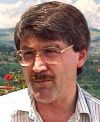 Paul Davies
Paul Davies is theoretical physicist, cosmologist, astrobiologist, author
and broadcaster. He currently holds the position of Professor of Natural
Philosophy in the Australian Centre for Astrobiology at Macquarie University.
His previous academic appointments were at the Universities of Cambridge,
London, Newcastle upon Tyne and Adelaide. His research has ranged from the
origin of the universe to the origin of life, and includes the properties of
black holes, the nature of time and quantum field theory. Davies is well known
as the winner of the 1995 Templeton Prize - the world's largest annual prize -
for his work on science and religion.
In addition to his research, Professor Davies is well known as an author,
broadcaster and public lecturer. He has written over twenty-five
books, both popular and specialist works, which have been translated into
many languages. He writes regularly for newspapers, journals and magazines in
several countries, and has been a longstanding contributor to The
Economist, The Guardian, The New York Times, The Australian, The
Sydney Morning Herald, The Age, The Bulletin and New Scientist.
He was for two years a weekly opinion columnist for the Adelaide Advertiser.
Among Davies's better-known media productions were a series of 45 minute BBC
Radio 3 science documentaries.
Two of these became successful books and one, Desperately Seeking
Superstrings, won the Glaxo Science Writers Fellowship. In early 2000 he
devised and presented a three-part series for BBC Radio 4 on the origin of
life, entitled The Genesis Factor. His television projects include two
six-part Australian series The Big Questions and More Big
Questions and a 2003 documentary on BBC4 about his work in astrobiology
entitled The Cradle of Life. This media work was recognized by the
award of the 2001 Kelvin Medal by the UK Institute of Physics and the 2002
Michael Faraday Prize by the Royal Society for his contributions to promoting
science to the public. In April 1999 the asteroid 1992 OG was officially named
(6870) Pauldavies in his honour.
|
|
To return to previous topic, click on your browser's 'Back' button. |
Email
link |
|